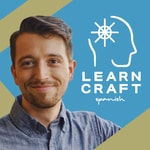LearnCraft Spanish – Détails, épisodes et analyse
Détails du podcast
Informations techniques et générales issues du flux RSS du podcast.

LearnCraft Spanish
Timothy Moser
Fréquence : 1 épisode/2j. Total Éps: 371

Classements récents
Dernières positions dans les classements Apple Podcasts et Spotify.
Apple Podcasts
🇺🇸 États-Unis - languageLearning
05/08/2025#86🇺🇸 États-Unis - languageLearning
04/08/2025#98🇺🇸 États-Unis - languageLearning
03/08/2025#93🇺🇸 États-Unis - languageLearning
02/08/2025#98🇺🇸 États-Unis - languageLearning
01/08/2025#79🇺🇸 États-Unis - languageLearning
31/07/2025#85🇺🇸 États-Unis - languageLearning
30/07/2025#99🇺🇸 États-Unis - languageLearning
29/07/2025#98🇺🇸 États-Unis - languageLearning
27/07/2025#91🇺🇸 États-Unis - languageLearning
26/07/2025#96
Spotify
Aucun classement récent disponible
Liens partagés entre épisodes et podcasts
Liens présents dans les descriptions d'épisodes et autres podcasts les utilisant également.
See all- http://lcspodcast.com/237
13 partages
- http://lcspodcast.com/61
11 partages
- http://lcspodcast.com/120
4 partages
Qualité et score du flux RSS
Évaluation technique de la qualité et de la structure du flux RSS.
See allScore global : 53%
Historique des publications
Répartition mensuelle des publications d'épisodes au fil des années.
250: Final Spanish Practice!
Épisode 250
vendredi 1 mars 2024 • Durée 23:12
Let’s use a big spoken Spanish quiz to practice Leer, Escribir, Aprender, Viajar, and everything else we’ve learned this week!
249: Hogar
Épisode 249
jeudi 29 février 2024 • Durée 30:15
Today we’re going to learn some new nouns for household items, including the words for “home”, “furniture”, “refrigerator”, and “kitchen”. We’ll also get some spoken practice quizzing with these new words in lots of different contexts.
248: Limpio, sucio, mojado, seco
Épisode 248
mercredi 28 février 2024 • Durée 43:57
Today we’ll learn a bunch of new Spanish adjectives, including the words for “clean”, “dirty”, “wet”, “dry”, “cold”, and “hot”.
247: Desayunar, Almorzar, Cenar, Viajar.
Épisode 247
mardi 27 février 2024 • Durée 30:49
Why does Spanish have so many different verbs for eating? Today we’ll talk about “having breakfast”, “having lunch”, and “having dinner” in Spanish. We’ll also explore the verb Viajar, which means “to travel”, and we’ll get lots of spoken practice using these verbs in real sentence contexts.
246: Leer, Escribir, Aprender
Épisode 246
lundi 26 février 2024 • Durée 38:14
Let’s learn some Spanish verbs related to reading, writing, and learning! We’ll explore the verbs Leer, Escribir, and Aprender, in a wide variety of uses. Practice along out loud!
245: Practice Existir and Olvidar
Épisode 245
vendredi 23 février 2024 • Durée 28:09
Let’s get lots of spoken practice with verbs Existir, Extrañar, Soñar, Olvidar, Despertar, and Alegrar, as well as our new nouns, numbers, and everything else we’ve learned this week. Predict the Spanish and speak out loud!
244: Los días de la semana y los meses del año
Épisode 244
jeudi 22 février 2024 • Durée 47:57
Let’s learn some new nouns you can use to talk about time, including the days of the week and the months of the year, as well as how to say things like “Wednesday the 27th” or “Friday the 14th”. We’ll get lots of practice trying to say things like this in real time!
243: Haberlo, Haberte, Haberme
Épisode 243
mercredi 21 février 2024 • Durée 29:43
Why does Spanish sometimes use pronoun contractions with Haber? Let’s learn how to use contractions like haberlo and haberte. We’ll get lots of practice with these contractions in real sentence contexts.
242: Olvidar, Despertar, Alegrar
Épisode 242
mardi 20 février 2024 • Durée 43:21
Let’s learn the verbs Olvidar, which means “to forget”, Despertar, which roughly means “to awaken”, and Alegrar, which roughly means “to rejoice” or “to cheer up”. We’ll practice these new verbs in a variety of sentence contexts.
241: Existir, Extrañar, Soñar
Épisode 241
lundi 19 février 2024 • Durée 24:34
Let’s learn the Spanish verb Existir, which means “to exist”, Extrañar, which means “to miss”, and Soñar, which means “to dream”. We’ll practice all three verbs in all of their most common forms and uses.